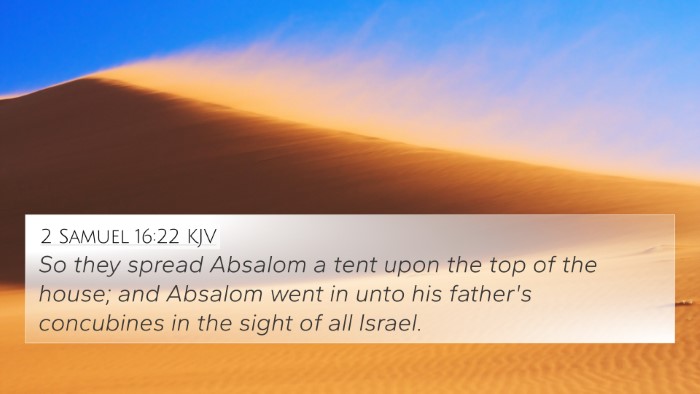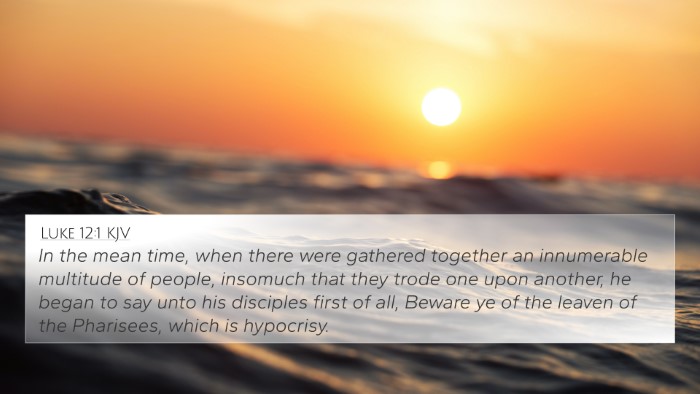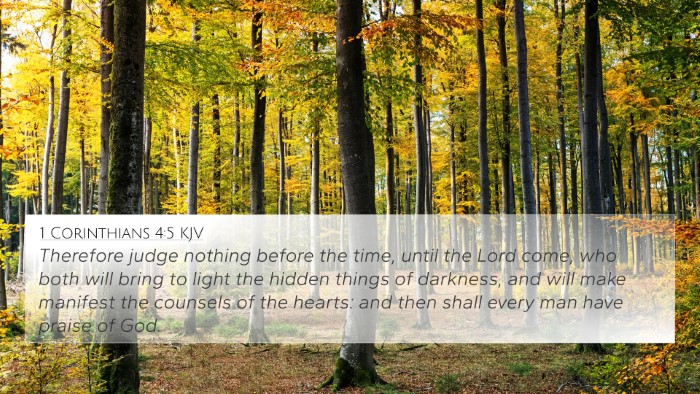Understanding 2 Samuel 12:12
In this verse, God communicates through the prophet Nathan to David, revealing the consequences of his actions after his sin with Bathsheba. The verse reads: "For you did it secretly, but I will do this thing before all Israel, before the sun." This passage holds profound implications regarding divine judgment, sin, and the nature of God's retribution.
Context and Background
To fully grasp the meaning of this verse, we must look at the surrounding narrative:
- David's Sin: David took Bathsheba, the wife of Uriah, and arranged for Uriah to be killed in battle to cover up his sin.
- Nathan's Confrontation: Nathan uses a parable to expose David's wrongdoing, illustrating the gravity of his actions.
- Divine Judgment: God’s message through Nathan emphasizes that while David attempted to hide his sin, God sees all and will publicly display the consequences.
Interpretations from Commentaries
Insights from various public domain commentaries enhance our understanding of this critical verse:
-
Matthew Henry: Matthew Henry emphasizes the idea of public shame as part of God's judgment. He suggests that the lavish and hidden nature of David's sin will be met with a very public consequence, reinforcing the principle that what is done in darkness will be brought into light.
-
Albert Barnes: Barnes points out that God's actions are swift and will occur in front of the whole house of Israel. This serves as a reminder that divine justice is not only certain but also transparent. Barnes highlights the importance of accountability for leaders, noting that they are held to a higher standard.
-
Adam Clarke: Clarke elaborates on the symbolism of the "sun," representing clarity and visibility. He indicates that God's revelation of David's sin is both inevitable and necessary for proper governance and spiritual integrity within Israel.
Thematic Connections
This verse ties into several key Biblical themes:
- Sin and Consequence: The verse highlights the concept that sin has ramifications, not just for the sinner but for the community.
- Divine Justice: God's justice may not always be immediate but is assured and can manifest publicly.
- Repentance and Restoration: Following God’s judgment, there is an opportunity for repentance, which is crucial for realignment with God’s will.
Bible Verse Cross-References
To enrich the analysis, we can identify several cross-references that illuminate this verse’s message:
- Psalm 51:4: "Against you, you only, have I sinned and done what is evil in your sight." - David's acknowledgment of his guilt.
- Numbers 32:23: "But if you will not do so, behold, you have sinned against the LORD..." - A reminder of accountability.
- Galatians 6:7: "For whatever one sows, that will he also reap." - A New Testament echo of the principle of consequence.
- Proverbs 28:13: "Whoever conceals his transgressions will not prosper, but he who confesses and forsakes them will obtain mercy." - The importance of transparency with sin.
- Luke 8:17: "For nothing is hidden that will not be made manifest, nor is anything secret that will not be known and come to light." - The inevitability of revelation.
- James 5:16: "Therefore, confess your sins to one another and pray for one another..." - Encouragement for community accountability.
- 1 Timothy 5:24: "The sins of some people are conspicuous, going before them to judgment..." - A reminder that some sins are obviously known and must be dealt with.
Exploring Cross-Referencing Resources
For those engaged in cross-referencing Biblical texts, various tools and methodologies can aid in exploring these connections effectively:
- Bible Concordance: A crucial resource for finding specific verses related to themes and words.
- Bible Cross-Reference Guide: These guides facilitate the discovery of related verses across the Scriptures.
- Cross-Reference Bible Study: A method emphasizing the interconnectivity of verses to deepen spiritual understanding.
- How to Use Bible Cross-References: Learning to navigate these tools aids in effective Bible study.
- Bible Chain References: Following a chain of related verses can illuminate overarching themes and teachings.
Conclusion
2 Samuel 12:12 is a profound reminder of the nature of sin, accountability, and divine justice. By examining this verse alongside the teachings of renowned commentators and through the lens of thematic connections and cross-references, we gain a more nuanced understanding of its implications.
As you engage with the Word, consider the importance of transparency in your spiritual walk, acknowledging that while God's justice may seem delayed, His purposes are ultimately for restoration and holiness.







